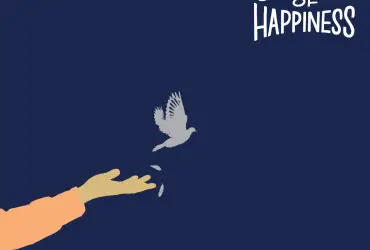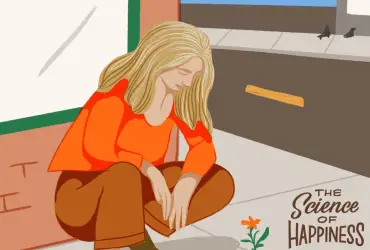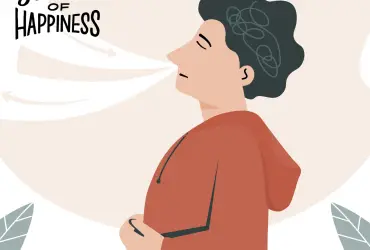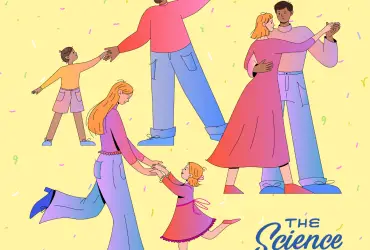Dacher Keltner Hi, this is Dacher Keltner, welcome to The Science of Happiness. A few months ago we asked you to email us if you felt like you were at a crossroads in life and searching for a new sense of purpose.
We were really moved by your responses. They came from all over. From South Africa to Gujarat, India to Raleigh, North Carolina – which is where our guest today lives.
Patty Brown is a mom to three grown kids, has some grandkids, is recently divorced, and now close to retirement. In other words, she's ready to start a new chapter in life. Here’s what Patty’s emailed us:
Patty Brown I'm coming to the end of a long career and I'm now a single woman. After a long marriage ended in divorce a few years ago and have raised three sons now grown and gone. As my main focuses during the last four decades, will no longer take center stage in the years ahead. I'm wondering how and where I can find a compelling purpose in my life. I'm open to exploring all options and hope I can find a purpose as meaningful as those that have guided my days until now.
Dacher Keltner We suggested Patty try a practice shown to help people find direction and meaning in life. And today she joins us today to tell us how it went. Later, we’ll hear from the researcher who created the practice in hopes it would motivate her college students to stay in school. But first, Patty, thanks for joining us on the science of happiness.
Patty Brown Oh, I'm glad to be here.
Dacher Keltner When you're thinking about this next stage of your life and what the defining themes will be, I wonder: What was purposeful and meaningful in your life before all these big changes?
Patty Brown Well, for me, raising a family was always something that was important to me. I knew that early on. So, that drove me and I had my children in my 20s and early 30s. And then once you have kids, you know, they do kind of set the stage for what happens next. So devoted, you know, decades to focusing on their well-being, raising them, trying to do your best, you know, to have a cohesive family that's, you know, well-adjusted. And then the realities of raising a family necessitated my working to establish financial security. So, all of that kind of shifts with time. You know, the kids are now gone. And I don't need to worry about paying for orthodontia any longer or, you know, college loans. That's all in the rearview mirror, which is lovely in a lot of ways.
But, you know, after devoting a large portion of one's adult life to a particular task, It's kind of challenging to shift course. And so, I have found myself looking for a bit of a roadmap.
Dacher Keltner yeah, so After you emailed us, we gave you a list of different practices you could try to help zero in on what your purpose in life might be right now.
You chose the “Life Crafting” exercise, which has these four steps: Write about what’s most important to you - what you value in life. Reflect on what your ideal future would look like. Then map out how you're going to get there, and how you’ll keep track of your progress. And finally make a public commitment to your goals, like by telling a friend.
So, how’d it go?
Patty Brown It went fine. I actually had a list of, a very extensive list of values. So I went through and used my yellow highlighter and just highlighted the ones that were meaningful to me. What were they? And oh gosh, everything from kindness to compassion to persistence, resilience, kind of intellectual studies or growth, fitness, exercise, cooperation, connection, engagement, involvement. You know, I highlighted a lot. Unfortunately, I'm one of those people that if I do that, the page pretty much ends up mostly yellow. So–
Dacher Keltner Everything's important.
Patty Brown Well, not everything. There were some that I skipped.
Dacher Keltner What did you skip?
Patty Brown Oh, well, let me get the list. I've got it handy.
Partnership, members. Synergy, teamwork. Sacrifice, I skipped.
Dacher Keltner You've done a lot of that, a mom of three boys.
Patty Brown Excellence, greatness, perfection. I gave up perfection a while ago.
Dacher Keltner Thank God.
Patty Brown Exactly. You know, so the list goes on and on
Dacher Keltner Interesting. So the next step in the exercise is what?
Patty Brown It was to reflect on your ideal future. I was asked to write about what kinds of personal and professional relationships I'd like to have, what my ideal life would look like, what I would want in an ideal job or volunteer experience, and then to imagine my best possible self and what the future could look like if there were no constraints. And the part about no constraints, that was kind of fun.
Dacher Keltner Were you on a tropical beach and dancing the salsa? So were you doing?
Patty Brown You know, hiking, mountain climbing, you know, all the physical stuff that unfortunately, as the years go by does get a little more challenging. Just kind of a picture of all of the good qualities one would like. It was what I could daydream about.
Dacher Keltner You know, when I think about my own life, it's like, you know, well, I really value, you know, working toward a little bit more justice and then images of maybe I'll volunteer in prison or whatever come to mind. Did that occur for you? Where thinking about the values pointed to what your future would look like?
Patty Brown Yeah, I could see that for me, what was important would be connecting with people, being able to have a pretty direct impact because the value I have for connection and engagement means that for an activity to be meaningful to me, you know, it helps to be able to transfer those values kind of directly over to it. So I could see that sort of face to face or in-person experience being more appealing to me than working at a distance or at a remove from the people.
Dacher Keltner One of the things I have trouble persuading people of in all of this happiness work is to set social connection as a goal, you know, because people think of it as like, well, and it's not about my physical health and it's not spiritual or whatever. Why did you pick social connection?
Patty Brown I think I enjoy it the most. And I'm pretty much all about having a good time. We're only here for a blink of an eye. So if you're not having fun, not that social connectedness is all about fun. It's much deeper and more meaningful than that. But I think, you know, people are what's truly important to me in the world. I know some people are motivated by other things, but for me, it's those connections to family and friends and strangers and you know, anyone else I meet that matter.
Dacher Keltner I agree. So now it gets really hard. You have to write down how you will attain your goals. So what’d you write down? Plan of action!
Patty Brown Yea, which works for me. As an instructional designer, I'm used to dealing with goals and objectives. So what I did was kind of think about the areas that my desires kind of centered around. So I come up with, kind of, domains, if you want to call them, areas. One had to do with health. One had to do with social connectedness, engagement, kind of interpersonal. And one had to do with work and engagement and purpose as it relates to that. So, I deliberately kind of made a commitment to myself that what I would do would be to write one goal in each area and track it for a month and then come back and reassess it and then, you know, set a goal for the next month or keep that same goal and just see how that worked. And maybe that time period might change after a bit. But I could see that, you know, these were long term-goals so that it would be necessary to kind of reassess periodically to, you know, ensure I'm making progress.
Dacher Keltner Yeah. The goal I have related to personal growth learning was to spend an hour a week learning about something new or doing something new or working on some sort of skill development.
Dacher Keltner Have you done that yet?
Patty Brown Well, I'm doing it now.
Dacher Keltner You mean right now?
Patty Brown Yeah, this counts, right?
Dacher Keltner So the final step is, you know, come straight out of kind of classic social psychology, which is like make a public commitment to your goals. And when we do that, you know, it's part of our reputation and it enhances the motivation to stay close to them. So who did you share your goals with?
Patty Brown Well, I took a slightly different tack with that because I don't always follow all the instructions.
Dacher Keltner Wait! I thought you were an instructional designer!
Patty Brown Well, I'm good at writing them. That doesn't mean I'm following them.
Dacher Keltner Are you going to send us your rewrite of this?
Patty Brown No. What I did do was obviously that step was put in there to provide some accountability. And I totally get that. And I actually, you know, I'm happy to share some of the objectives I've set in kind of an informal fashion with friends. There's, you know, nothing. I'm ashamed of. So that's not the problem. But in order to actually, you know, kind of measure, well, did I do this or did I not? For me, tracking this on my calendar is the way I'm going to do it. And I've actually started already. One of the fitness goals had me saying that I would exercise for 30 minutes a day, four days a week. And so I've been ticking that off for the last few days on my calendar.
Dacher Keltner But you didn't share it with somebody else?
Patty Brown Well, other people do know that I've started exercising again and they know I'm you know, that I like to socialize and so forth. So that's not an issue. And, you know, I can share this with my friend on Sunday if it's really important to you.
Dacher Keltner I don’t know, Patty, I'm not sure this is acceptable.
Patty Brown Oh well, You know, at my age, I don't care if it goes on my permanent record.
For me, the standing on the street corner, you know, holding the sign, telling people what I'm going to do. I didn't didn't particularly appeal to me. So my way of tracking that is a little more, I guess, private or personal, you'd say. And because it's for my benefit, you know, and I'm aware of that. So, you know, for me to do it, that particular system, I think will work a little better for me because my friends are all very nice. They're not going to chide me if I, you know, and they're also not going to say, did you go to exercise class four times this week? Whereas I can ask myself that and see it on my calendar. So actually, I think it may be a bit more effective for me.
Dacher Keltner Right. What were some of the takeaways from this exercise for you, Patty? At this phase of your life?
Patty Brown It was helpful for me to see that, yes, having this structure was useful. It kind of gave me a framework that I could use. So, that made me feel more comfortable with the ambiguity of what lurks ahead in the future, which is pretty significant, I think. The other thing I could see that I hadn't really anticipated, I’d kind of just been perhaps wishing that the ideal solution would just come to me in a flash of inspiration. And what I saw was that this needs to be an ongoing process and kind of a process of incremental change or steps. So, kind of not one and done, but something that needs to occur and some sort of ongoing basis. And then the other thing that was a little bit interesting for me was that, kind of for the first time in my life, I am able to put myself first, which sounds kind of, I don't know, self aggrandizing or, you know, somewhat egotistical. But I think probably women, you know, who have focused on raising a family and who work in what might be considered the helping professions, that’s not something we've had a lot of experience with necessarily. And so, seeing that some of the stuff that I can do for myself, like take care of my health, is important and has value, that's kind of a revelation.
Dacher Keltner Yeah, no, I hear you. You know, through the Greater Good Science Center, we do a lot of collaboration with people in the healthcare field, a lot of women and, you know, just they you know, they it's very easy then for them to think about helping others, and compassion. Very, very strong at that. And then you say, “Well, how about yourself?” And it's like, “What?” You know, “Yeah, that's unethical or, you know, it's not appropriate,” but it is part of part of well-being. I'm curious what it was like for you at this stage in your life just to go through this exercise. You know, it's a poignant period when your kids are really launched and you're starting to move away from a career.
Patty Brown Well, I for me, it was, I think, kind of an optimistic experience because it was about looking forward and kind of engendered a sense of self efficacy because I'm the one in control, at least as much as anybody can be in control of anything, you know, as to what happens next, I get to kind of set my own agenda, and that's kind of liberating. So as well as perhaps a little bit, yeah, I won't say scary, but, you know, there's a certain amount of uncertainty associated with that. So, you know, it's a bit daunting sometimes to think that I'm in charge of my own life because it just kind of happened until now. And so, now is the first time I've kind of had the leisure to sit and say, “Well, what I like to happen in the next ten, fifteen years?”
Dacher Keltner I hear you.
Patty Brown And I think what I found is that it is more a combination of multiple activities, multiple ways of having that kind of well-rounded, full life that it doesn't have to be necessarily, you know, 80 percent work or 80 percent family with a smattering of other things that I can kind of allocate my time and energy to a variety of things, and that together they comprise that sense of purpose and that sense of a meaningful life. At least that's what I'm hoping.
Dacher Keltner Well, Patty, thank you so much for being on our show and thank you for sharing your experience with this life-crafting exercise. It was really, really insightful.
Patty Brown I enjoyed it.
Dacher Keltner Up next we hear from Michaéla Schippers – the researcher who created the life crafting practice that Patty tried – to try and motivate her university students to stop dropping out of school.
Michaela Schippers I had 800 students each year, one class. And then I asked program management how many of these students remain at the end of the year? And they said only half of them. And I was flabbergasted.
Dacher Keltner More on the science, up next.
A strong sense of purpose can motivate us and give us momentum to fulfill our goals. Studies have also linked it to better mental and physical health.
Our senior producer Shuka Kalantari reports how the life-crafting practice helped curb the 50 percent freshman drop-out rate at one university.
Shuka Kalantari When Professor Michaela Schippers first starting teaching at Erasmus University Rotterdam's School of Management, she learned that half of all freshmen in the Business Administration program dropped out before the end of the school year.
Michaela Schippers I was flabbergasted. So I started looking for a way to solve this whole problem.
Shuka Kalantari She was already familiar with research on purpose and goal-setting, so she created a practice based on this research – the Life Crafting practice that we're featuring in this episode. And she assigned it to her students in one of their mandatory first-year classes.
Michaela Schippers If you don't put it in a course or and you just give it to students who say, hey, this is a really good intervention, do it, then you guess what happens. They say thank you and maybe one or two percent will do it. So we had, I think, ninety-nine percent response rate in the sense that every student did this, as part of course, and they could also, at that time, opt out if they didn't want to do it anymore.
Shuka Kalantari Students were directed to write a list of their values and goals, and imagine what their ideal lives would look like in the future. Then, they created a concrete plan to attain their goals. And finally, they made a public commitment to those goals.
I told Professor Schippers about Dacher’s interview with Patty Brown and how the ‘public commitment’ part of the practice didn’t really vibe with Patty.
Michaela Schippers There's not a hundred percent need to do that, but I think it can add something to it, because if you tell people about your goals, for instance, one very nice thing is that people will help you. So if I tell people my goal, then people will see an opportunity or point out opportunities to me, which is, I think, really important.
Shuka Kalantari The life-crafting experiment worked – really well. Their freshman dropout rate declined by nearly 40 percent. The practice was even more helpful for immigrant students – it cut their dropout rate in half.
Michaela Schippers And interestingly, it isn't doesn't matter if you remember even having done it or not, because there were students who didn't even remember they had these assignments, but they improved anyway. And there was one student who said, I thought it was a stupid exercise. I didn't like it at all. And then I noticed that I started reaching those goals, those silly goals that I had to write down. So it may work even if you think it's a stupid exercise. As long as they give themselves this little push in the first year, they will keep on going.
Shuka Kalantari On our next episode of the Science of Happiness, author Michael Pollan joins us to talk about his new book, This is Your Mind on Plants, and shares what happened to his mind when he tried to give up something he really enjoys.
Michael Pollan There's no way to understand the role of any substance in your life or practice in your life until you take a break from it.
Dacher Keltner Thank you, Shuka.
I’m Dacher Keltner. Thanks for joining us on the Science of Happiness.
What do you think of when you hear the word ‘play’? Tell us by emailing happinesspod@berkeley.edu or using the hashtag #happiness pod.
This episode is part of the Greater Good Science Center’s “Purpose Across the Lifespan” initiative, supported by the John Templeton Foundation. Learn more about that initiative at GGSC.Berkeley.edu/purposelife.
The Science of Happiness is a co-production of UC Berkeley’s Greater Good Science Center and PRX. Our Senior Producer is Shuka Kalantari. Sound design by Jennie Cataldo and Ben Manilla of BMP Audio. Our Associate Producer is Haley Gray. Our Executive Producer is Jane Park. Our Editor-in-Chief is Jason Marsh.









Comments